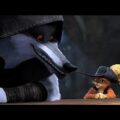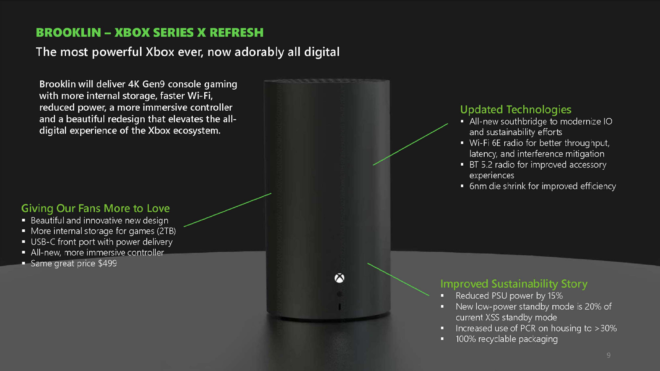Quarantine Control #181: A Blown-Out Jobless Saga

Recent ledes for these Quarantine Control posts have focused on how COVID-19 has come roaring back, though it truly never left. The mere fact that COVID had variants and would continue to mutate meant it was going to be a problem again eventually, despite the public’s desire to ignore it. But it’s now “back” to a frightening degree, with cases remarkably being near 2020’s peak. That’s tough to believe considering the lack of media coverage and overall muted concern. COVID will clearly never leave us; the answer will instead be continued vaccinations, a sadly tough ordeal with how widespread conspiracy theories are.
Geoffrey Barnes
John Wick: Chapter 4 (2023)
Source: Starz on Demand
Episodes: 1 movie (The last in the series?)
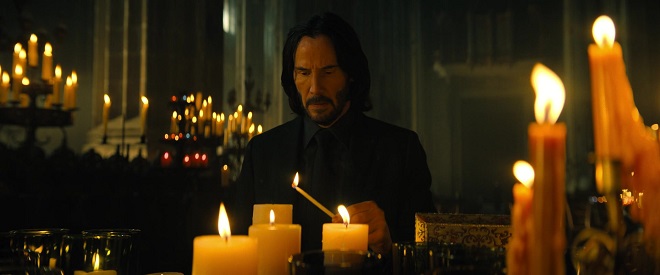
John Wick: Chapter 4 seemed like a recipe for disaster, despite its predecessors being superlative action films. The first John Wick movie took off not only because it was a modern action film that wasn’t afraid to fully embrace its “R” rating, but because of its sheer execution. As in, “execution” of the movie’s concept, and not sheer number of dudes John Wick himself sends to their deaths. It was a tightly-paced action movie with solid-enough character development and excellent pacing that was the perfect length at 102 minutes, just the kind of movie the public wanted at the time it released in 2014 (nine years ago, remarkably). The sequels were still entertaining, but weren’t quite as tightly-knit thanks to their longer runtimes. Credit to them for continuing to find more reasons for John Wick to slaughter every dude with a gun sent his way, though.
Here came John Wick: Chapter 4, promoted as having a massive 169-minute runtime — two hours and 49 minutes. This sounded ridiculous on its face; I had a hell of a time thinking of any action movie, “traditional” or superhero, that needed to be that long. It made sense when considering how this was planned to be two movies released in parts, similar to what’s happening with the current Mission Impossible installments. But this didn’t erase the potential for the movie being a bloated mess.
But the movie overall is… well, it IS kind of bloated. Parts of the film did not need to run as long as they did, which created pacing issues. Other aspects seemed like excuses for director Chad Stahelski and potentially David Leitch (the latter of whom stayed on as producer after going uncredited as co-director for the first film) to demonstrate their sterling abilities at creating action set pieces. These obvious flaws, however, didn’t stop me from enjoying every second of it.
The story of John Wick: Chapter 4 starts not long after the third movie ends, with John himself doing his best to fight and survive against the High Table’s vicious efforts. They still seek to punish John (Keanu Reeves) after killing someone on Continental grounds at the second film’s conclusion, an act against the hotel’s rules. But there’s another twist in how the Marquis Vincent Bisset de Gramont (Bill Skarsgård) strips Winston Scott (Ian McShane) and his assistant Charon (the tragically now-late Lance Reddick) of their leadership positions at the Continental for failing to kill John in the third film. Here, John seeks to challenge the Marquis for his role as a powerful member of the High Table, which creates a bit of tension. A little.
A new John Wick film was bound to deliver plenty of action sequences, and it indeed does so in spades. The first half hour of the film is comparatively slow, with the movie taking its time to establish the characters, settings, and the reasons why they’ll eventually fight. But there’s one set piece after another following this, with only the necessary bits of story in between.
There are times where a movie watcher doesn’t need anything deep, where all they need to see are some guys being shot and others being shot at. Occasional martial arts and swordplay can break up any monotony. This was my mindset before watching John Wick: Chapter 4, and oh man did it deliver on this promise in spades. Did the movie need this many action sequences? No. Is it a bit too long? Absolutely. Are several of the sequences themselves over the top to a nigh-hilarious degree? Sure. Did I care by the end? Nope. I don’t feel guilty for saying the movie was nonstop bliss, making that 169-minute runtime blaze past.
The acting talent and character development, the amount present in the film, helped it along. Reeves has never been the best actor, but he’s talented enough to bring the best out of the John Wick role. But I greatly enjoyed Rina Sawayama’s role as Akira Shimazu, the daughter of the Osaka Continental head that John asks for help. That head, Koji Shimazu, was also played well by Hiroyuki Sanada. John Wick’s main rival throughout the film, Caine, was a joy to watch thanks to the talents of Donnie Yen, playing a blind warrior yet again. The movie also gave the most touching sendoff it could for the dearly-departed Lance Reddick through his role as Charon.
It helped that the film was beautifully shot. Prior movies were no slouch in the visuals department, yes, but the direction and cinematography for the action locations in Osaka and Paris were on-point.
I enjoyed the hell out of John Wick: Chapter 4, and I don’t feel ashamed for doing so. It’s a textbook example of how a movie can have blatant flaws, some room for improvement, but come out great regardless. Sawayama’s role as Akira is a bit underdeveloped, and Asia Kate Dillon is peculiarly MIA as The Adjudicator from the previous film. It may seem like one John Wick saga has ended, but there are plenty more right around the corner, perhaps even including those two actors. The further potential for successors following the success of the John Wick films suggests that we’ll get plenty of movies just like it, likely from Stahelski (well, after the Lazarus anime) and Leitch, if they’re not stated spinoffs like the upcoming Ballerina movie. I’m not complaining.
Angela Moseley
Vinland Saga, season 2 (2023)
Source: Cruchyroll
Episodes: 24
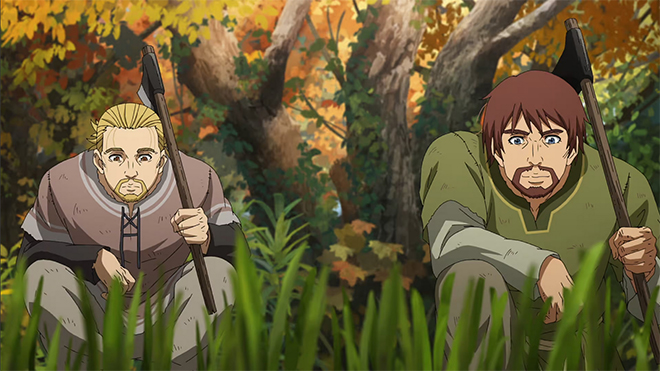
I originally saw the first season of Vinland Saga in 2019. Prior to this show’s premier, I’d never heard of the series despite it being a manga penned by Makato Yukimura that started in 2005. (The manga is currently ongoing as of this writing.) Two things drew me to trying out this series. First, it was being produced by Wit Studio, best known for their work on adapting Attack on Titan. (At least until the project was passed to MAPPA in 2020.) Second, while there’s a lot of anime that take inspiration from Norse mythology, there aren’t very many deal with vikings. Better yet, the show doubles as a historical drama and an action show.
I was surprised to learn that Thornfinn Karlsefni was a real person who led an expedition of Icelandic explorers to Vinland, or current day Newfoundland in the year 1010. The settlement was established centuries before Europeans such as Christopher Columbus would discover the new world. The settlement itself was short-lived, otherwise North American history would have turned out a bit differently. While Vinland Saga is about Thorfinn’s journey west, that’s not where the series begins. This is a drama, not a documentary.
It’s a story about a boy who lost his warrior-turned-pacifist father way too young thanks to political maneuvering. Thorfinn seeks revenge against Askeladd, the man who killed his father. In a gambit to eventually grow strong enough to enact revenge, the boy joins Askeladd’s band of mercenaries. Thornfinn works and kills countless people as a mercenary all to fulfill his goal and to quell his own rage. All of that is rendered pointless when Askeladd is felled by someone else.
Season 2 picks after some time has passed from the dramatic events of the first season. Einar is a young man living in Northern England with his mother and sister. The village has finally been restored after a viking attack a few years earlier. Suddenly, vikings raid again and Einar can only helplessly watch as his mother and sister are killed, and he’s sold into slavery. He’s eventually bought by a seemingly kind man named Ketil to work his farm. He’s partnered up with a silent Thornfinn, who was purchased some time earlier. If the two can work the plot of land they’re assigned to and make it productive farmland, they’ll be allowed to buy their freedom.
Einar attempts to work hard, but he finds Thornfinn to be a strangely quiet, and broken man. Eventually, Einar learns that Thornfinn used to be a warrior, just like the vikings who destroyed his village. He confronts Thorfinn and finds the former warrior has nothing left to live for. As the farm comes along, and the two deal with the hardships of being enslaved, and Thornfinn finally addresses the guilt and trauma of his past life as a warrior. He vows to atone for the many lives he’s taken by never killing again, and becoming a pacifist. However, this is easier said than done in a violent, might makes right world.
This part of Vinland Saga is a departure from the action-heavy first arc. At least it is for the first dozen episodes. Almost all the season is spent on Ketil’s farm, save for a few episodes that feature King Canute and his consolidation of power in terms of ruling both England and Denmark. The pace of the series does pick up when the young king sets his eyes on commandeering land from his Danish subjects in order to fund his occupation of England. Given how peaceful the first half to the series mostly was, the sudden shift to violence is jarring. Of course, that’s the point as war and death are all too common in this part of Europe at the time. Additionally, the cycles of violence, sorrow, and injustice serve as motivation for Thornfinn to think about Vinland, a place he once heard about as a young boy.
Thornfinn’s appearance and mannerisms are very different from the first season. It’s to point where more than few viewers find him to be weak, or a coward, or even becoming too idealistic for his own good. I’d argue these people have completely missed the point. Thorfinn was set on killing Askeladd to assuage his own anger, and would kill anyone to obtain that goal. Once Askeladd died, the young man lost all his reason for living. He never had a plan beyond felling Askeladd with his own hands. Essentially, all the hardship he endured was for nothing. So he spends the first part of the new season broken and empty, with no real way to deal with his PTSD. It’s not until he meets Einar, and encounters kindness from others on Ketil’s farm that he finds a new purpose.
Through Einar, he comes to recognize the people he killed were just like his eventual friend. Families trying to survive in a harsh world, people who never wronged him in any way. Under the wrong circumstances, Einar could have very well been his victim if they’d met in England before both being sold into slavery. Once Thornfinn has this revelation, he wants to make a place for people like himself and Einar in the world– people who don’t believe in violence and glory. A place “where people don’t need swords.” Sure, it can be seen as idealistic, but the world needs people willing to give peace and kindness a chance. By his own actions Thornfinn manages to sway the hearts of others, while finding a way to begin healing from his trauma. Sure, the results of his actions appear to be utterly absurd on the surface, but digging deeper it makes sense that those who share some of his ideals can be swayed.
In short, the farm arc of Vinland Saga is not about a young man who becomes and adult ready to avenge the wrongs from his youth. It’s about a young man who finds the courage to give peace and kindness a try in a world drunk on power and violence. It’s no surprise that sections of the New Testament appeal Thornfinn, even though he’s not a Christian. The series purposefully includes these passages from the Bible. Make no mistake, this is not a religious show, but it does illustrate how a message of peace can appeal to those whose lives have been filled with suffering and want to try something different.
All of these pieces were set to move Thornfinn closer to his goal of getting to Vinland in this historical drama. I look forward to where the story goes next. Though part of me is curious to see how things go once the group gets to Vinland, knowing that the settlement doesn’t last long, and more hardships and violence awaits this character in the new world. I don’t imagine Thorfinn will remain a complete pacifist for long.
I absolutely recommend Vinland Saga, even if you’re not very much into anime. It’s one of those rare shows that illustrate how masterful this animation medium can be.
Joseph Daniels
How far can you go with the argument, “It gets better if you keep watching”? How much bullshit must one take from a main character before you can safely drop a series? It’s one thing to watch a movie and see the character development happen within a two hour time period, but it’s absolutely another thing to be watching an anime, get annoyed at the tendencies of the main character to act like a perverted douchebag, then see in the comments, “He gets better! He grows out of this behaviour! The series gets better later! He totally gets better, I proooooooooooooomise!” It starts to feel like the fans of the show are lying to you and trying to get you to watch it long enough that Stockholm Syndrome sets in and you toss your hands in the air in defeat and say “Fine, you win, I don’t care that he’s a borderline pedophiliac asshole.”
That’s the main problem with creating a series that’s such a slow burn. This week’s anime opts to take a very long route to show the adventures of its main character, so you’d be forgiven if you jumped ship before the point where he “gets better”.
I do wish that I had a lot more time to get in depth with everything I want to discuss this week like I do in my Final Fantasy and Dragon Quest retrospective articles, but even a single one of those articles takes literal days. I’m going to have to gloss over a lot of stuff if I want this to be posted in a reasonable time frame.
Mushoku Tensei: Jobless Reincarnation (2021)
Source: Crunchyroll
Episodes: Ongoing
Rabbits?: Background characters only (so far)
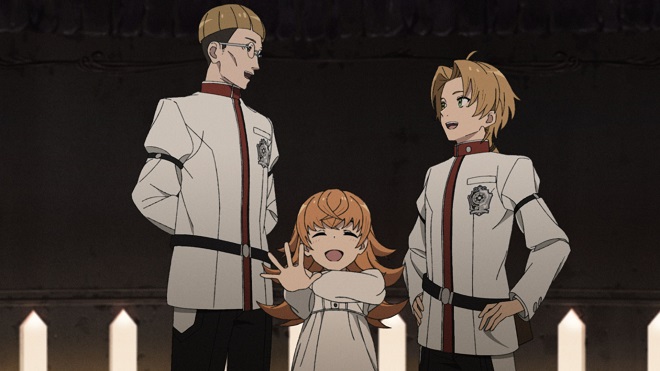
Mushoku Tensei is the story of a man who gets bullied relentlessly in his old life until one day he dies rescuing some teenagers from a truck, and let me just say that the opening of the first episode goes all in on the concept. By 2021, the isekai genre was already big, but Mushoku Tensei acts like it’s the first series to ever kill off its main character and have them live a new life elsewhere. This may be because the series is based on source material from 2012, when reincarnation was not yet fully established as a means to transport people to an alternate world. The anime focuses on the main character’s final moments in his old world and first moments in his new world for far longer than you’d expect, but right away, you can tell that he’s going to be a problem.
The main character’s original name is never revealed to us, but in his reincarnated life, he is Rudeus Greyrat, and he begins his life as nothing more than an unrepentant sex pest. Do you know all those characters that people like to sexualize, and they look and act like little kids but they’re really two thousand years old, and that’s the justification people use to explain why it’s okay to sexualize them? In Rudy’s case, it’s kind of the opposite. He’s really in his late thirties and then his early forties, which makes his behaviour towards the young girls he likes to ogle kind of pedophilia. It doesn’t matter that his body is underage, his soul and mind are not. This is one of those few times when the character being, in reality, older than they look makes it even worse than if he was actually the age he presents as.
The argument fas bring up is that the show gets better over time, and if you’re patient with the main character, he eventually becomes someone you can fully root for. But that’s the thing. Should I be expected to watch a series starring a pedophile because he supposedly stops being one after a while? He hardly, if ever, faces any consequences for his objectification of women and underage girls (the only one who actually stands up to him on a regular basis is Eris) and the only reason he stops is because he has greater responsibilities to focus on, not because he learns it’s wrong.
You could consider the show to “get better” twice. The first point is at the end of episode eight, where a calamity causes the series to turn from a slice of life show into a fantasy adventure. An entire slice of the world gets carved out of it, with everyone caught in the calamity being teleported magically and randomly around the world. Rudy is caught in this calamity with his student Eris (she’s actually two years older than him, but is still his student), and he ends up on the Demon Continent, which sounds like a death sentence for him and Eris, but he manages to befriend a member of the most feared race in the world, a Superd, and the trio journey across the continent in the hopes to get Rudy and Eris home.
It’s probably a tall order to expect casual anime viewers to watch an eight episode prologue, but that’s how long it takes to develop the season’s story. Until then, viewers will have to cope with an anime that loves to accentuate all of the main character’s worst traits, and not just him. The world is painted as being absolutely gross towards women, and this happens so often, not all of it is punished on screen. Rudeus himself spends those eight episodes basically being a horny thirty-something human stuck inside a child’s body, something which sadly continues for quite a bit longer, even after he’s suddenly got a lot more responsibilities on his plate.
The second point is in episodes sixteen and seventeen, when his reunion with his father doesn’t go very well, and his father accuses him of treating his time spent away as a vacation. The two eventually make up and agree to treat the situation they found themselves in like adults. Rudy’s father has been searching for his family ever since the calamity of episode eight, and has not yet had much success. Rudy decides to search for his family as well, now that he knows the full extent of the calamity. The rest of the season is devoted to telling side stories and showing Rudy’s journey home, but it ends in heartbreak for him as he confronts the reality of what the calamity did to his home and has to say goodbye to the friends he made along the way.
It’s actually surprising just how long it takes for Rudy to learn to be a bit more respectful. You’d think that the turning point would’ve been when he was trying to playfully strip his childhood friend, whom he had thought was male, only to find out his friend is a girl, and now he looks like a rapist even though he wasn’t actually trying to rape her. Instead, he continues to ogle people and sexually harasses his student Eris for about as long as he knows her. This is one of those shows where you begin to wonder if the actual target audience are the kinds of people who want to justify their own nasty behaviour and/or downplay that of the people they vote for. Generally, you’re supposed to be able to identify with a protagonist and when that protagonist is like Rudy, what’s that say about those who stick up for him?
Worse, Rudy doesn’t actually learn his behaviour is wrong. He just stops because he has more important things to focus on. I’ve heard from fans that Rudy grows past his early behaviour. No, he doesn’t! He just gets too busy to perv on anyone, then gets too depressed, then gets erectile dysfunction! That’s not growing and changing for the better! He even still sexually harasses Eris after he stops perving on everyone else, and the only reason it stops is because Eris leaves the story entirely!
The tragedy of it all is that if you cut Rudy out of the equation and look at everything else, it’s a gorgeous series with a lot going for it. The fantasy world is very well realized, full of wonder and keeps revealing its secrets to us, even late in the first season. The narrative shows signs that it’s been planned well in advance, and having spoiled myself on some of the details yet to be revealed in the series, I’m so glad they worked ahead like that, because the kind of story they want to eventually tell requires that sort of planning, or else the narrative falls apart from plot holes and hastily added lines meant to hand wave inconsistencies. I have to stress this again: this is a great series as long as you try your best to ignore Rudy’s antics in the first season. There’s a really good video made by the YouTube channel Mother’s Basement that goes into the first season of the series in a kind of depth that I don’t have time to, and which also looks at Rudy in a much more favourable light than I do, and I would encourage everyone to watch it.
At this point, we’re about halfway through the second season, and with Rudy’s perviness being almost completely absent now, it’s been a much more enjoyable series, which actually makes me look forward with cautious optimism to the latter half. At this point, I want to say to just skip the first season, but it contains important background information, world building, and pretty much everything you need to know about the main character. Otherwise, you don’t know the significance of anything he does in the first episode of season two, nor does the season go back and explain it for new viewers. It doesn’t have to, because season one exists.
The second season attempts to improve Rudy’s character by making the pair of panties he stole early in season one become a source of emotional fortitude and strength for him in season two. He doesn’t hold onto them for the sexual thrill any more (and I don’t really think his problems in man land have anything to do with this), and this is probably the closest we see him grow out of his deviant ways. I don’t entirely trust him to have matured fully, but this is enough for now.
I’m not going to say the series gets better. I’m not going to say the main character grows as the series goes on. However, I’m also not going to say that the series doesn’t get better, because it does eschew certain unsavory elements by the time season two begins. Instead, I’ll take a middle road and say that the main character has a pretty rapey personality and doesn’t actually learn not to be, he simply has too much on his plate to show it any more. You’ll have to experience this behaviour for the entirety of the first season right up until close to the end, when the series finally decides to fully commit to the fantasy adventure story and stop showing us Rudy’s tendencies to objectify those he lusts after. I don’t know if the rest of season two is going to maintain this or if it’ll backslide towards Rudy’s original characterization. I wouldn’t be surprised if it does betray me like that, I’d simply be disappointed.
Here’s the thing: you can have a character be bad towards women and not be rapey, and also have him gradually improve over time after learning how wrong he is. Just watch Avatar: The Last Airbender and pay attention to the character of Sokka. He’s one of the best examples of a character who grows over time into someone the viewer can look up to. Not only that, but he also learns how to fight and contribute to the party instead of being dead weight. Rudy, however, is no Sokka. Rudy never learns why his behaviour is wrong, nor does he let the physical punishment he gets for sexually harassing Eris deter him from doing it.
One of the things I’ve been doing lately is rewatching the films in the Marvel Cinematic Universe. I’m probably going to not watch the ABC shows alongside them because technically you can get away with watching them separately, they didn’t make them required viewing for any of the movies, but the movies are required viewing for what happens in the early seasons of Agents of S.H.I.E.L.D., especially season one, which devotes an episode to the clean-up after Thor: The Dark World and which devotes the last third of the season to the fallout caused by Captain America: The Winter Soldier, the ripples of which could be felt for much of the rest of the series. As I was watching Mushoku Tensei, I couldn’t help but think about how Rudy’s slow as molasses character growth compares to the character growth displayed by the superheroes of Phase One, so let’s take a brief detour, shall we?
Marvel Cinematic Universe, Phase One
Source: Disney+
Iron Man (2008)
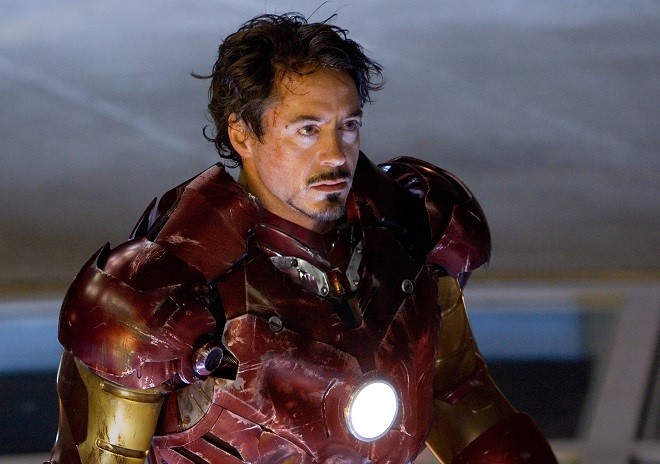
Yeah, it’s been fifteen years since this film was released. I watched it in the theatre with Angela when it came out, and we both liked it. Personally, I was pretty happy at the end when Tony Stark spoke those four words that changed everything. “I am Iron Man.” Up until then, super heroes were always hiding their identities. Batman. Superman. Spider-Man. The whole thing about having a secret identity was there to protect their loved ones from the recurring villains in their life. Batman can’t risk someone unhinged like the Joker learning who he is, for fear that his family or friends would become a target. Likewise, Superman made an enemy of Lex Luthor, a rich and powerful businessman who would make life hard for him and his friends if his secret identity were to come out. It feels like they both have good reasons to hide their identities.
As for Tony Stark… why should he? I imagine that’s what he was thinking when he spoke those words. He probably realized that he was the one who got himself out of that cave at the beginning of the film. He created his suit. He defeated the Iron Monger with a little bit of help from Pepper Potts. Of course he’s going to take public credit for that! He also doesn’t have any recurring villains who want to do him harm yet, so he doesn’t need to protect himself by hiding his identity.
Tony Stark is arrogant, but the movie goes to great lengths to get us to sympathize with him so that we’re on board with a superhero like him who is full of himself, because after becoming the victim of his own weapons being used against him, he wants to get out of the weapons business and he actually succeeds. The shift of focus of Stark Industries away from weapons manufacturing and towards more peaceful technologies is the main thrust of the plot of this film. I was impressed by how much of the suit’s process of development we see, from the original that Tony builds to escape the cave, to the streamlined version that he develops once he returns home. We also see a lot of failures, which is to be expected, of course, but he gradually figures out what works and what doesn’t, and in the end, he becomes a hero that the world can look up to.
Tony Stark doesn’t change over the course of the first film, per se, in that he’s still arrogant and looks out for himself much of the time. He even admits to a laundry list of character defects. He just tries to save innocent lives a bit more now, suggesting that he at least thinks of others more than he used to.
The Incredible Hulk (2008)
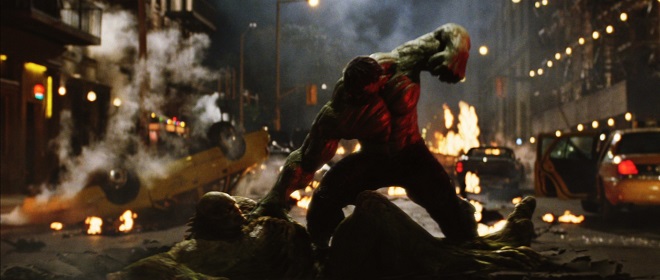
What’s interesting about this film is that it was intended to be somewhat of a reboot of The Hulk, released in 2003, meaning that technically speaking, The Avengers isn’t the first time in the MCU that the character of Bruce Banner has been recast. The 2003 film isn’t intended to be part of the MCU, but the filmmakers understood that having a second origin story so soon after the first would likely not have gone over well. It’s why I skipped Andrew Garfield’s time as Spider-Man, but was able to enjoy the original Batman series of films, because despite changing the actor several times, they didn’t try to retell Batman’s origin story when Michael Keaton was replaced by Val Kilmer and then Val Kilmer was replaced by George Clooney. It was all treated like one single continuity, and Batman was basically James Bond.
The bad news is that Bruce Banner is being played by Edward Norton in this film, and I’ll confess: I’ve always thought of this movie as the black sheep of the MCU.
Bruce Banner starts the film trying his best to keep the monster at bay while working at a bottling factory and seeking a cure for his condition. A mishap with his blood on a bottle catches the attention of the United States military, who rush in to try to apprehend him. This fails spectacularly and Bruce, having experienced his first Hulk incident in months, decides to make the trip back to the United States to try to gain access to the data from the experiment that turned him into the Hulk, in the hopes that the key to a cure can be found.
Meanwhile, the leader of the special forces team he defeated takes it so personally, he agrees to receive a serum modeled after the one used on Bruce. Although the Hulk’s nemesis in this movie is Emil Blonsky as The Abomination, I can’t help but feel like the villain is actually General Ross, the man who pursues Bruce Banner relentlessly for the entire movie, and who doesn’t approve of Bruce’s interest in his daughter.
I suppose you could consider Bruce’s story arc in this movie to be his coming to terms with and accepting the beast inside of him, but it does sort of feel like a movie that you can either take or you can leave, it doesn’t seem like it matters in the long run. The reason I think of this movie as a black sheep is because there’s nothing in it that really influenced the MCU as a whole. Not until recently, anyway. There’s foreshadowing of a character who I think was intended to be the next Hulk villain but a second solo MCU Hulk film never actually happened. Captain America: Brave New World will feature several characters from this movie (not Bruce Banner, though), so I’m assuming it can be seen as a sequel of sorts, but the fact that it took this long to do anything with them (aside from General Ross, who appears several times throughout the MCU) suggests that this is probably the most skippable movie in the franchise.
Iron Man 2 (2010)
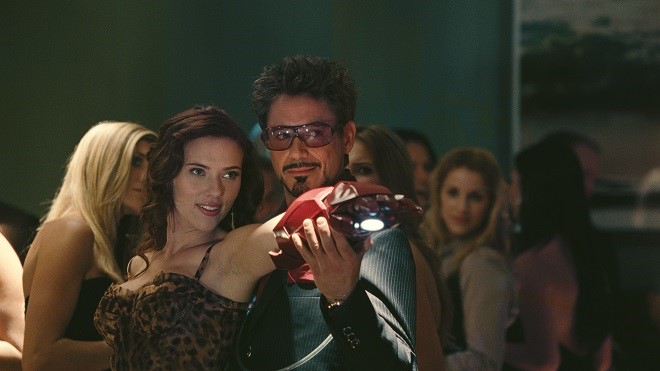
The second Iron Man movie tells a story that focuses on Tony coming to terms with the relationship he had with his father. He also has to deal with a grudge born of the actions of the previous generation, as well as his own mortality. Unfortunately, his behaviour gets a bit self destructive and it makes it a bit hard to want to cheer for him at times. I can understand what his friends must’ve been going through, because they knew he could be better and he was actively choosing not to be. However, he gets his shit sorted out and finds out there’s hope for his future, so he rises to the challenge of defeating this film’s villain, Whiplash.
I think the challenge of a movie like Iron Man 2 is that it felt like they wanted to give Tony some character growth but they had to have him backslide into some utterly selfish behaviour for the middle part of the film in order to make it work. It isn’t shameful to need help, and Tony needed to realize that he can’t do everything himself. That’s another big part of the film, Tony realizing that he’s not going to be able to pull himself out of every situation. This is something he desperately needs to learn if the Avengers initiative introduced after the end credits of the first film is going to succeed. He needs to learn to work with others, or else he’s just going to get in the way.
The biggest problem he’s facing at the start of the film is that he’s being slowly poisoned by the arc reactor in his chest, something which he has been trying and failing to find a solution for. He also doesn’t have a way to counteract the poison in his blood, but thanks to Nick Fury buying him some time and giving him a few hints to pursue, Tony Stark is able to create a brand new element that can power his arc reactor without killing him.
Dealing with Whiplash is another matter entirely. Tony could probably handle him alone, if it was a one on one fight. But it isn’t, for Whiplash has an army of drones backing him up. This is where Tony’s friend James Rhodes comes in. During the middle act of the film, he’d confiscated a suit of armour after he had tried to beat some sense into Tony, and it’s in this suit of armour that he’s able to help him, donning the mantle of the War Machine. Together, Iron Man and War Machine defeat Whiplash, thus completing Tony’s character arc in the film. He’s still his usual arrogant self, but he’s learning to work better with others, which is what matters the most at this point.
Thor (2011)
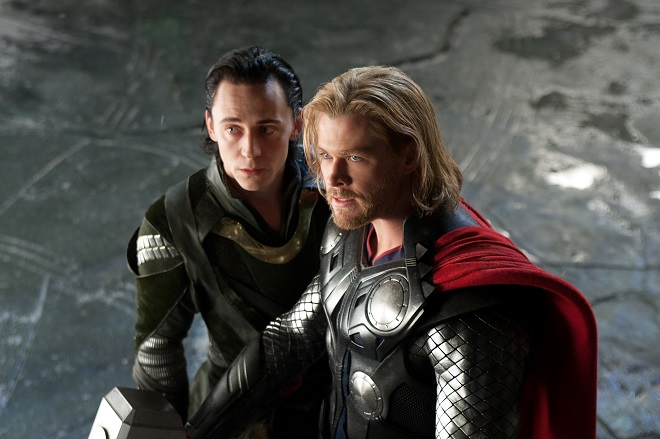
This is the film that I thought about the most when watching Mushoku Tensei. It’s also got my absolute favourite soundtrack out of the entire MCU.
When discussing a character that starts out as anything but heroic but in the end becomes someone you can cheer for, you can’t find a better example than Thor. He begins as a brash, arrogant young man itching for a fight and gets himself banished for an act of war against the Frost Giants of Jotunheim, which he was intending to be retaliation, but which ends with the slaughter of many innocents. As Odin banishes him to Earth, he also enchants Thor’s weapon, Mjölnir, so that only those who are worthy can wield it, thus requiring Thor to mend his ways in order to regain its use, then maintain that integrity for the rest of his days.
Fortunately, it also has the side effect of making sure no one else can take it for themselves, so the most that S.H.I.E.L.D can do is set up a containment perimeter for it as they study it. I should probably note that S.H.I.E.L.D. has been a thing since the very first film in the series, where we also meet regular recurring characters like Nick Fury and Phil Coulson. Iron Man 2 introduces Black Widow and this movie introduces Hawkeye (as well as Thor, naturally), meaning that we have nearly the entire roster of the Avengers filled out by now.
The movie does a good job of humbling Thor. He gets hit by Jane Foster’s truck twice and drugged at the hospital, but it’s his attempt to retrieve Mjölnir that devastates him the most. When he realizes that he has been deemed unworthy, he tries to come to terms with his exile on Earth, coming to befriend some of the locals.
Meanwhile, Loki is embarking on his own journey and finding out that he’s not who he thought he was. Anyone who has played Final Fantasy VII can probably tell where Loki’s story is going. Just like Sephiroth learning of his past, Loki becomes antagonistic when he finds out that he’s actually the son of the Frost Giants’ leader, and unfortunately chooses to work against his brother, Thor. Ironically, though, if Loki had just left well enough alone and not sent the Destroyer to Earth, Thor wouldn’t have attempted to sacrifice himself for the sake of the people of Earth, thus making him worthy to wield Mjölnir again. A newly re-powered Thor defeats the Destroyer and returns triumphantly to Asgard, where he thwarts Loki’s plan to completely destroy Jotunheim. I think what I like the most about the enchantment placed upon Mjölnir is that now the hammer can be used to restrain someone, because they’ll be unable to lift it off of themselves. It’s a practical use that I don’t think I had ever thought about until this movie debuted.
It’s Thor’s journey from selfish brat to hero, in a film that’s only 114 minutes long, which I kept on coming back to when watching Mushoku Tensei. Imagine following Thor for roughly four or so movies as he picks fights he has no business picking and hardly changes, but fans keep assuring everyone that Thor’s going to change in the fifth movie, they promise he’s going to get better in the fifth movie! That’s roughly what it feels like to follow Rudy during the first season. You start to wonder if the fans are just lying to you, and it gets worse near the end of the season when you stop seeing their reassurances that Rudy gets better in Crunchyroll’s comments section and you see them act increasingly hostile towards criticism, blaming the viewer for watching when they’re the ones encouraging the same viewers to be patient and let Rudy get better. You can’t have it both ways, promising that things will improve, then antagonising those who rightly point out that those particular elements of the series aren’t improving. They’re literally saying “Keep watching, it gets better! Keep watching, it gets better! Keep watching, it gets better! Keep watching, it gets better! Wait, why are you still watching it if you don’t like it?!” You’re telling them to!
This is getting pretty long, so I’m going to stop here and talk about the rest of Phase One next week, because Captain America follows a character who arguably doesn’t change much throughout the film but has to struggle to earn his place in the war effort and prove himself, and then The Avengers is the big team up film which brings everyone together. Despite that I intended this brief discussion of the early MCU to support my discussion of Mushoku Tensei, I think I’ll document my journey through the MCU in the coming weeks, from the rewatching of the films I have already seen, to the first viewing of many films I haven’t, thus allowing me to catch up to the present day, with Guardians of the Galaxy Vol. 3 as the current latest film, and The Marvels likely coming out before I’m done.
This Week’s Short Film
The Moonseeker (2022; uploaded 2023)
Here’s some advice: Don’t feel bad about taking COVID-19 seriously. Now that new boosters are making their way around the country and world, for free, now is the time to get them. It’s also a good time to mask up again, especially for the sakes of more vulnerable individuals around. See you next week.



